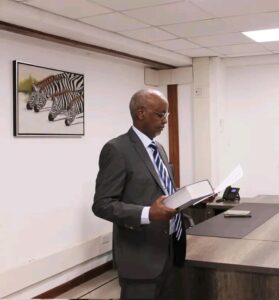In the early 2000s, Kenya faced a growing demand for electricity as more homes and businesses needed power. To meet this rising demand, the World Bank stepped in to help the country expand its electricity generation capacity. They oversaw the tendering of four new power plants.
These included one geothermal plant and three diesel-powered plants. Among these was the Triumph Power Generating Company. The total cost for all four projects was $623 million, financed through a mix of commercial bank loans and World Bank instruments. While the goal was to increase power supply and reduce blackouts, the process of awarding contracts raised serious questions, especially in the case of Triumph.
When Kenya Power and Lighting Company (KPLC) advertised an Expression of Interest for a diesel power plant in Athi River on May 29, 2009, Triumph Power emerged as the winner.
However, it was later revealed that Triumph had only been registered seven months earlier in October 2008. This raised eyebrows because the company had no prior experience in power generation. It was a new and unknown entity with no proven track record. Even more troubling was the ownership structure. Triumph’s shares were largely controlled by one family, and part of its ownership included a shell company called Southern Intertrade.
This company was registered in the British Virgin Islands, a known tax and secrecy haven, making it difficult to know who really owned or benefited from the deal.
Tom Mukhwana has come out strongly on this issue. Writing on X, Tom criticized the government and those involved in awarding the tender to Triumph. He said it is wrong for public resources to be handed to ghost companies with no experience, just because they are connected to powerful individuals. Tom argued that the deal was a way to quietly hand billions to insiders while ordinary Kenyans continue to suffer from expensive electricity.

Faisal Abbas. Photo Courtesy | Facebook
He questioned how a company like Triumph, which had only existed for a few months and lacked any power generation history, could win a contract worth billions. Tom believes this kind of hidden corruption is what is dragging Kenya backwards and forcing people to pay high power bills for services they barely receive.
Further digging shows that one of the key figures behind Triumph is Faisal Abdirahman Abass. He was listed as the beneficial owner of the British Virgin Islands shell company linked to Triumph. His involvement in government goes back many years.
Abass was first appointed to the board of the Agricultural Development Corporation in 2000. Then in April 2003, he joined the board of KenGen and stayed there until November 2006.
In June 2007, he was appointed the chairman of the newly created Rural Electrification Authority (REA). Shockingly, while holding these positions, he was quietly involved with Triumph, which won a tender to build an 83MW diesel power plant at Athi River’s Export Processing Zone. This deal was expected to earn over Kshs 23.3 billion in dividends, much of it going to a few hidden hands.
A World Bank report later showed that Triumph was contracted to sell one kilowatt-hour (kWh) of electricity at Kshs 29.90, or $0.23. This price was much higher than average. The contract also included a “Take or Pay” clause, which meant that KPLC had to pay for the power even if it wasn’t used.
This made the electricity from diesel plants like Triumph’s extremely expensive for consumers. In the 2023/2024 financial year, the cost of electricity from Triumph was almost two and a half times higher than other diesel power producers. This shows that the public was not only paying for overpriced electricity but also for capacity that might not even be used, just to enrich a few well-connected individuals.
This case is just one example of how public contracts in Kenya can be manipulated to benefit a few people while hurting the majority. The Triumph Power deal, filled with secrecy, conflicts of interest, and inflated costs, continues to cost Kenyans heavily.



